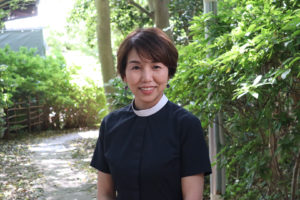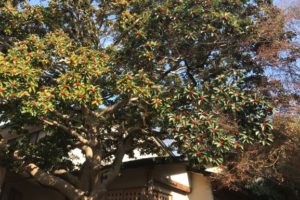Even a Good Person Can Be Saved
Isaiah 1:10-18; Psalm 32:1-8; 2 Thessalonians 1:1-4, 11-12; Luke 19:1-10
Fr Michael Pye
Our readings today reminded me of a passage from a short Buddhist text which runs: “Even a good person attains birth [in the Pure Land], how much more so an evil person.” (Zennin nao mote, ōjō wo togu, iwanya akunin wo ya.) I wonder if some of you know where this comes from. Well, it’s from a writing called the Tannishō which contains sayings and reflections attributed to Shinran, the founder of Shin Buddhism (Jōdo Shinshū) in thirteenth century Japan. This little book looks a bit like a Bible doesn’t it, with its leather cover and gilded pages. I think it’s supposed to. It’s called the Shinshū Seiten, the “holy scripture of Shinshū” published by the Otani Branch.
Perhaps I should mention that Jōdo Shinshū, or Shin Buddhism, is the tradition which is mainly based at the Nishi Honganji and the Higashi Honganji in Kyoto. Otani University, where I have been working part-time for several years, is linked to the latter, the Higashi Honganji. The story of Shin Buddhism is long and complex, but there are some striking parallels to our Christian faith. In particular, the reliance on grace. For us it is the grace of God, and for Shin Buddhists it is the “other-power” of Amida Buddha. In both cases we rely on a greater power and not on our own power or strength. It seems to me that this is a most important similarity. In a nutshell, the teaching of Shin Buddhism is based on the idea that Amida Buddha, when still a bodhisattva in a previous existence, made numerous vows to save other living beings, and bring them over to rest in a Pure Land beyond this life. In one of these vows, the people are encouraged to call on his name with the formula Namu Amida Butsu. Namu Amida Bu…
In one of our hymns we sing: “At the name of Jesus, every knee shall bow.” For Christians salvation sometimes seems to come through the very name of Jesus. There is no other name, it was said. And yet there are other names.
So what is this all about? As Isaiah said, speaking as a prophet: “Come now, let us argue it out, says the Lord.” Let me come back to that quotation. “Even a good person attains birth [in the Pure Land], how much more so a bad person.” (I think it’s better to say “bad person” than “evil person” which you will find in most translations for akunin.) But what is this about? The reasoning behind it is like this. One might think that even a bad person can be saved, so how much more a good person. That would be natural. The good persons are out in front, like saints. However, a person who is already confident in being “good” might not feel the need for being assisted, through grace. Such a person justifies himself or herself and does not turn to Amida Buddha for assistance, or to God. But a bad person, conscious of being a sinner, is more likely to be just as conscious of the possibility of being redeemed through the assistance of a greater power, an “other power”.
It seems to me that this opposition between a “good” person and a “bad” person is exactly what we have been hearing about lately, in the parable about the Pharisee and the tax-collector. And today it came up again in the story about the very effective tax-collector who nevertheless felt that he needed something quite different, if he was to be “saved” – namely help from the teacher who was passing by. It was Jesus who took the initiative in their encounter, asking to be invited in. Jesus was for him the “other power.” Those who grumbled regarded Zacchaeus as “a sinner” because he collected taxes for the occupying Romans; but Jesus called him to be his host, accepting him just as he was. To this Zacchaeus responded by promising to make amends, by giving his profits away again. The people who grumbled were probably “good” people, and, my word, if we didn’t have quite a few “good” people in the world we would be in even greater trouble than we are. But even those good people can be saved, so how much more a “bad” person. We find this way of thinking again and again in the teaching of Jesus.
Now, why is it interesting that we find this striking parallel between the Christian faith and Shin Buddhism? It can lead to quite complicated discussions. And as Isaiah said, speaking as a prophet, we have “to argue it out.” (1:18) Isaiah continued: “though your sins are like scarlet, they shall be like snow” and “though they are red like crimson, they shall be like wool.” (1:18) So for him too, it is persons presumed to be bad who will be transformed. This is almost the same dialectic as we find in the words of the Shin Buddhist. And here we are not even in the New Testament yet, but in the Old.
Or look again at the words of the Psalm: 32:4 For day and night your hand was heavy upon me; my strength was dried up as by the heat of summer. Selah! (Clang !)
Note: “my strength was dried up” – This is like the Shin Buddhist acceptance that through “self-power” we can achieve nothing. 32:5 Then I acknowledged my sin to you, and I did not hide my iniquity; I said, “I will confess my transgressions to the LORD,” and you forgave the guilt of my sin. Selah! (Clang !)
Note: This is like the Shin Buddhist acceptance of the “other-power,” the transcendent power, to transform us. 32:6 Therefore let all who are faithful offer prayer to you; at a time of distress, the rush of mighty waters shall not reach them.
Note: We shall be brought, so to speak, to the safety of the Pure Land, to dry land where there is no danger. Now I admit that there are big differences in the language of these texts – of course there are. And yet they express a widespread religious experience, namely that it is above all when we are conscious of our own lack of power, our own insufficiency, that assistance is more clearly at hand. Things must be turned around. And above all, we must not be proud. We must allow things to be turned around. It seems to me that the teaching of Jesus, and above all the actions of Jesus in choosing others and giving them confidence, are rooted in a widely known pattern of religious experience. There is so much to share when we explore the traditions around us. Let us recognize these affinities with gratitude. And of course, at the same time, we know that the path which Jesus took, his ultimate expression of self-giving, was at the same time the ultimate expression of “other-power” for the benefit of others. This is what underlies the very idea of atonement through his crucifixion, and this is what we hold high in celebration, as the phrase goes “until his coming again.” Amen.














